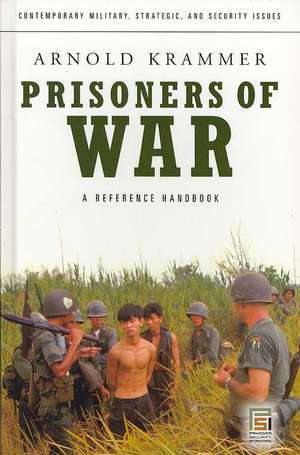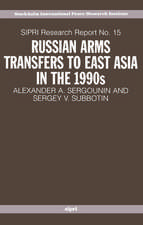Prisoners of War: A Reference Handbook: Contemporary Military, Strategic, and Security Issues
Autor Arnold Krammeren Limba Engleză Hardback – 29 noi 2007 – vârsta până la 17 ani
Din seria Contemporary Military, Strategic, and Security Issues
- 19%
 Preț: 362.88 lei
Preț: 362.88 lei - 18%
 Preț: 301.15 lei
Preț: 301.15 lei - 18%
 Preț: 363.15 lei
Preț: 363.15 lei - 8%
 Preț: 349.67 lei
Preț: 349.67 lei - 27%
 Preț: 364.15 lei
Preț: 364.15 lei - 18%
 Preț: 320.42 lei
Preț: 320.42 lei - 27%
 Preț: 439.09 lei
Preț: 439.09 lei - 27%
 Preț: 346.07 lei
Preț: 346.07 lei - 24%
 Preț: 327.59 lei
Preț: 327.59 lei - 27%
 Preț: 345.42 lei
Preț: 345.42 lei - 27%
 Preț: 344.90 lei
Preț: 344.90 lei - 14%
 Preț: 322.02 lei
Preț: 322.02 lei - 24%
 Preț: 363.98 lei
Preț: 363.98 lei - 24%
 Preț: 363.29 lei
Preț: 363.29 lei - 18%
 Preț: 300.68 lei
Preț: 300.68 lei - 27%
 Preț: 346.67 lei
Preț: 346.67 lei - 33%
 Preț: 371.40 lei
Preț: 371.40 lei - 28%
 Preț: 436.15 lei
Preț: 436.15 lei - 28%
 Preț: 436.99 lei
Preț: 436.99 lei - 24%
 Preț: 363.56 lei
Preț: 363.56 lei - 21%
 Preț: 241.95 lei
Preț: 241.95 lei - 14%
 Preț: 350.16 lei
Preț: 350.16 lei - 18%
 Preț: 337.97 lei
Preț: 337.97 lei - 18%
 Preț: 302.10 lei
Preț: 302.10 lei - 27%
 Preț: 379.45 lei
Preț: 379.45 lei - 27%
 Preț: 364.40 lei
Preț: 364.40 lei - 18%
 Preț: 301.15 lei
Preț: 301.15 lei - 24%
 Preț: 462.45 lei
Preț: 462.45 lei - 36%
 Preț: 206.82 lei
Preț: 206.82 lei - 14%
 Preț: 336.57 lei
Preț: 336.57 lei - 14%
 Preț: 349.30 lei
Preț: 349.30 lei - 14%
 Preț: 337.50 lei
Preț: 337.50 lei
Preț: 364.06 lei
Preț vechi: 501.84 lei
-27% Nou
Puncte Express: 546
Preț estimativ în valută:
69.67€ • 75.65$ • 58.52£
69.67€ • 75.65$ • 58.52£
Carte tipărită la comandă
Livrare economică 22 aprilie-06 mai
Preluare comenzi: 021 569.72.76
Specificații
ISBN-13: 9780275993009
ISBN-10: 0275993000
Pagini: 216
Dimensiuni: 156 x 235 x 21 mm
Greutate: 0.46 kg
Editura: Bloomsbury Publishing
Colecția Praeger
Seria Contemporary Military, Strategic, and Security Issues
Locul publicării:New York, United States
ISBN-10: 0275993000
Pagini: 216
Dimensiuni: 156 x 235 x 21 mm
Greutate: 0.46 kg
Editura: Bloomsbury Publishing
Colecția Praeger
Seria Contemporary Military, Strategic, and Security Issues
Locul publicării:New York, United States
Notă biografică
Arnold Krammer is Professor of History at Texas A&M University. A highly praised teacher for more than three decades, Krammer has written a number of books in both English and German about POWs, among them Nazi Prisoners of War in America and Hitler's Last Soldier in America (with Georg Gaertner), Undue Process: The Untold Story of America's German Enemy Aliens, and more than forty articles ranging from World War I, through the Spanish Civil War, World War II, and the Holocaust.
Cuprins
AcknowledgmentsChapter 1 War Prisoners through the AgesChapter 2 A Search for Legal ProtectionChapter 3 The Best and the WorstChapter 4 The Rules Have ChangedAppendix Primary DocumentsDe Jure Belli Ac Pacis (On the Law of War and Peace) by Hugo Grotius, 1625Lieber's Code (General Orders No. 100), 1863Brussels Declaration of 1874The Laws of War on Land, Oxford Manual, 1880Final Act of the International Peace Conference, The Hague, 29 July 1899Final Act of the Second Peace Conference, The Hague, 18 October 1907Convention Relative to the Treatment of Prisoners of War, Geneva, 27 July 1929Convention Relative to the Treatment of Prisoners of War, Geneva, 12 August 1949ESTIMATED POWs (Prisoners of War), MIA (Missing in Action) and KIA (Killed in Action) since 1775BibliographyIndexA photo essay follows page 80.
Recenzii
What to do with captured enemies in wartime is an ancient problem. Solutions vary with the prevailing mores and concepts of warfare. Since 2001, the US has conducted an ill-defined war on terrorism against enemies that allegedly do not qualify as soldiers under international law and therefore may be denied protection as prisoners of war (POWs). Krammer, a master of POW history, addresses fluctuating ways captors have treated war captives since earliest historical times. He discusses cases of prisoner parole, exchange, ransom, incarceration, enslavement, torture, religious sacrifice, and mass murder, and traces the irregular expansion of protection for POWs since Hugo Grotius defined the issue in terms of natural law in 1625. Krammer supports his narrative with extensive excerpts from military regulations and international agreements that clarified the status and rights of POWs during the 19th and 20th centuries. He refers particularly to Hague conferences of 1899 and 1907 and Geneva conventions of 1929 and 1949. Although terrorism is not new, Krammer seems to agree that recent styles of irregular conflict have introduced new conditions that reduce the effectiveness of international law in protecting POWs. Bibliography includes Internet references. Recommended. All levels/libraries.
The book begins with a simple truth: throughout the ages, soldiers have been fortunate to be taken prisoner when the enemy's blood is up. Using examples from ancient to modern wars, Krammer argues that it is much easier and far more convenient to kill surrendered soldiers rather than take the trouble and bear the expense of capture..While this book is not a comprehensive history of the POW experience, it is a first of its kind in terms of simplicity of approach, sequence of topics, historical frankness, and brutal honesty..Arnold Krammer has created something really significant for a master scholar: a primer, a place to start for anyone wanting to seriously examine and probe the complexity of captivity through the ages. Without a doubt, this book is a solid and welcome contribution to the field of historical POW studies.
The book begins with a simple truth: throughout the ages, soldiers have been fortunate to be taken prisoner when the enemy's blood is up. Using examples from ancient to modern wars, Krammer argues that it is much easier and far more convenient to kill surrendered soldiers rather than take the trouble and bear the expense of capture..While this book is not a comprehensive history of the POW experience, it is a first of its kind in terms of simplicity of approach, sequence of topics, historical frankness, and brutal honesty..Arnold Krammer has created something really significant for a master scholar: a primer, a place to start for anyone wanting to seriously examine and probe the complexity of captivity through the ages. Without a doubt, this book is a solid and welcome contribution to the field of historical POW studies.










